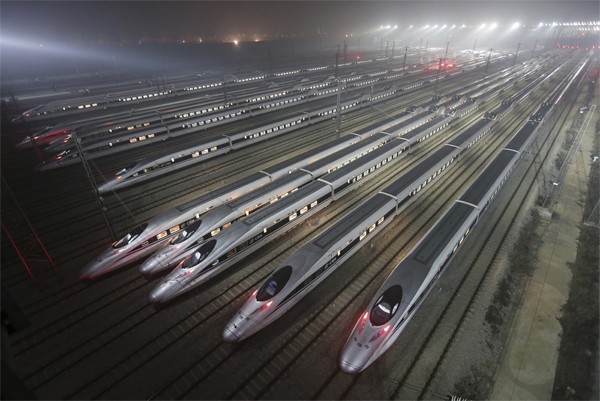Shanghai's railway authority announced yesterday that 32 new bullet train routes have been opened and will start operation by next month. The new routes will connect Shanghai to Guangzhou, Nanning in the Guangxi Zhuang Autonomous Region, Huaihua in Hunan Province and Nanchang of Jiangxi Province, according to Shanghai Daily.
With the new bullet train routes, passengers can reach Guangzhou in six hours and 51 minutes, or nine hours less than the 16-hour ride by regular "slow" train. The new high-speed routes will all have the Shanghai Hongqiao Railway Station as point of departure.
High-speed trains (G, D, C trains) in China run much faster than the regular, conventional ones. Currently, most of them run at an operational speed of 250-300 kilometers per hour, although the highest speed can be over 400 kilometers per hour.
The authority also announced that fast trains to cities like Harbin, Shenzhen and Lhasa will be upgraded to direct trains starting Dec. 10.
China has long been pursuing a continuing high-speed rail expansion program to speed up long-term economic productivity and competitiveness. Moving passengers to these high-speed lines frees up the older railways, which can then be used to carry more freight. It also creates jobs and drives up demand for construction, steel and cement industries.
The bullet train routes facilitate cross-city economic integration and promote the growth of China's second-tier cities. Since the trains run on renewable sources of power, having more of them is supportive of the government's goals of achieving energy independence and environmental sustainability.
The high-speed railway expansion program has also transformed China into a leading source of high-speed rail equipment and high-speed rail building technology. The Chinese train-makers, after absorbing imported technologies, localized the production processes, and now are even competing with foreign suppliers in the export market.
In fact, in related news from Reuters, the state-run CNR Corporation is making a pitch to sell its high-speed trains to California, marking "the first concrete attempt by China to sell high-speed locomotives abroad and establish itself as a credible rival to sector leaders such as Germany's Siemens, Canada's Bombardier and Japan's Kawasaki."



























